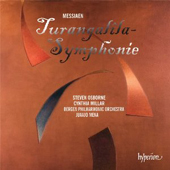
DEFINITIVE RECORDINGS

The music of Olivier Messiaen (1908-1992) has always, if anything, completely polarized admirers and detractors. And the Turangalīla-Symphonie,
his most ambitious and somewhat incongruous orchestral work is a case in point. Its large scale and unusual scoring for large orchestra, piano, ondes martenot, glockenspiel, celeste, vibraphone
and wood blocks, are only two of the points of contention. The ondes martenot, used within various works by Messiaen himself and other composers, is a strange electronic
keyboard instrument invented in 1928 by Maurice Martenot. A sort of antecedent to the Moog Synthesizer. Because it generates eerie and otherworldly sounds, it was
used extensively as the instrument of choice for horror and science fiction movies during the 1950s, and was even recently used by rock musicians (Frank Zappa - Radiohead).
Under lesser hands, this type of unconventional orchestration, Hindu symbolism and sprawling structure (ten movements) could appear gimmicky and might elicit derision
from the audience, as it did after its premičre performance in Boston under the direction of Leonard Bernstein in 1949. But such is the musical genius of Messiaen, and
the unique character of his style and distinctive sound, that the Turangalīla-Symphonie is now considered one of the masterpieces and
important milestones of the 20th century.
The fifth and sixth movements in particular, Joie du sang des étoiles and Jardin du sommeil d'amour always elicit strong reactions and opinions.
Even the uninitiated, or less musically educated, would find something to say about this music. The fifth is like an exploding riot of rhythms and cross-rhythms,
and an orgy of sounds as every instrument, including the ondes martenot, compete for position in a bid to express overwhelming joy. On the other hand, the following
movement, again in Olivier Messiaen's own unique language, is a beautiful depiction of the ideal of love, in which the ondes martenot itself becomes a thing of beauty.
Regardless of which side of the Messiaen argument you stand on, there is an undeniably fathomless factor to this music that quite simply pulls you in. It's almost like
a psychedelic, mind bending trip to the innermost depths of your soul and the outermost reaches of the universe and back.
Many fine versions of this work are available, notably Previn on EMI and Wit on Naxos, but this new Hyperion recording is something else.
Steven Osborne on piano, Cynthia Millar on ondes martenot, the Bergen Philharmonic Orchestra members and conductor
Juanjo Mena are all on top of their form and effortlessly convey a symbiotic relationship to each other, as if they had played this together already
a thousand times, but everything also sounds so spontaneous, electric and exciting. And for a work that can at times become overly saturated and congested by its own
dynamic weight, the recording engineers at Hyperion have done an amazing job at keeping everything clear and getting every note across. This should easily make the
short list for the next round of orchestral sound engineering awards.
Jean-Yves Duperron - September 2012